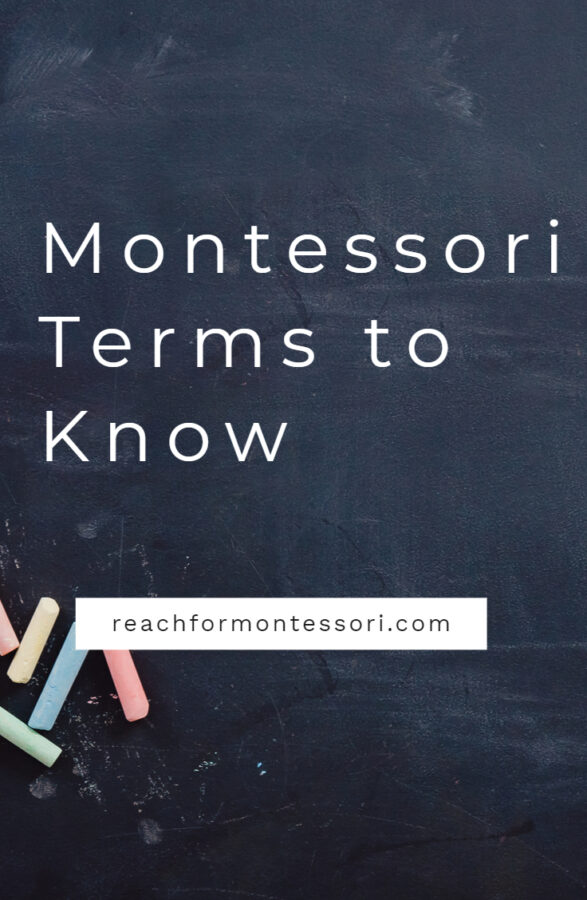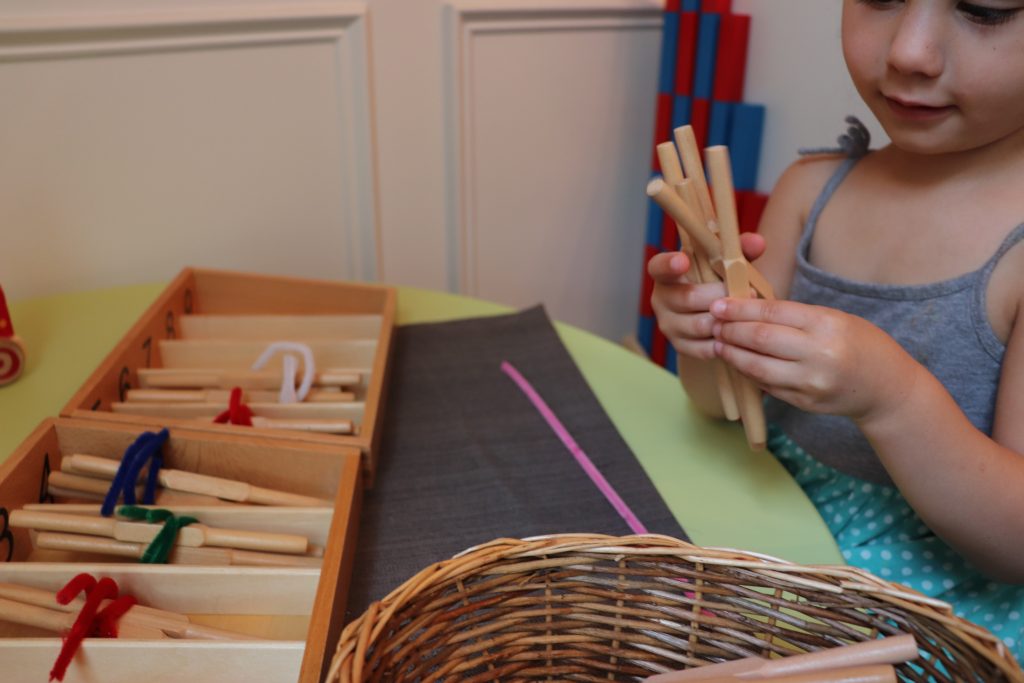Even if you are new to Montessori, you have likely already figured out there are a lot of Montessori terminologies to take in. There are several Montessori terms you will hear more than others, though.
Many terms are more helpful for Montessori teachers to familiarize themselves with than for Montessori parents to know.
I'm going to go over 14 Montessori terms that are important for Montessori caregivers and those choosing to homeschool in a Montessori fashion.

14 Montessori terms to know
1. Sensitive Periods
You may have heard people talking about their child being in “the sensitive period for potty training”, or a “sensitive period for math”.
2. Control of Error
Control of error is a Montessori term you will hear in reference to Montessori materials or even Montessori-aligned toys. Another way to describe this term is “self-correcting”.
Control of error, simply put, is a way for children to know that they have made an error without being told.
An example of this is the Spindle Boxes (a Montessori math material). There are exactly enough spindles to fill each numbered container.
If the child gets to the 9th container and only has 8 spindles left, they will know they made a mistake and should go back and check their work. The control of error for this activity – the number of spindles included in the set.

3. Work
The word, “work”, in Montessori refers to activities that are chosen by the child and that carry out a developmental purpose.
4. Grace and Courtesy
Grace and Courtesy lessons are Practical Life activities that help children learn strategies to navigate social situations. These lessons…
5. Prepared environment
Much of Montessori learning is dependent on the child's environment is set up to suit their needs. This is termed, “the prepared environment“.
6. Normalization
This is a Montessori term that refers to the process in which children adapt to a Montessori learning environment and are able to work independently and peacefully with their classmates and the materials.
7. Absorbent mind
The Absorbent Mind refers to the period in a child's life wherein they take in information from their surroundings via their senses. This period lasts from birth till around the age of 6.
8. Planes of develpoment
There are 4 planes of development defined in Montessori. These are developmental stages in which children are drawn to certain activities and the perfection of certain skills.
Read all about the 4 planes of development here.
9. Concrete to abstract
Learning concepts in order from concrete to abstract means that children will first work with materials in the most hands-on, sensorial way possible, then have their understanding reinforced in more abstract ways.
An example of this in math is the progression from the Golden Bead material, where children get to hold individual unit beads, to materials like the Hundreds Board, where they work with numbered tiles.
10. Coordination of movement
Coordination of movement is an important skill for children to develop in order to work within a Montessori environment. Montessori encourages coordination of movement through all Practical Life activities, as well as a specific subset of Practical Life activities designated to helping children interact with their environment with precision.
Pouring water, moving chairs so they don't scrape the floor, and closing doors gently all require coordination of movement.
11. Work cycle
A work cycle is a segment of time wherein children work with materials of their choice and engage with their learning environment uninterrupted.
12. 3 Period Lesson
A 3-period lesson refers to the method of having a child listen to a word as you present an item or card, having them demonstrate their understanding by pointing to the item/matching the card, then asking the child to articulate their understanding through a question.
3-period lessons are always presented in this order.
13. Point of interest
When reading through how to present different Montessori activities, you will see the term “points of interest”. Points of interest are details within activities that children may find interesting.
This is an important Montessori term to become familiar with, as it can give you insight into specific things about activities that children are drawn to.
When presenting a water pouring activity, for example, a child might be more interested in watching the water pour from the pitcher than they are in the ultimate task of filling the glasses.
14. Practical Life
Activities of Practical Life are those in which children engage in things that are typically reserved for adults, however with child-size tools that help them accomplish these tasks.
Activities such as pouring water, sweeping floors, and washing dishes are all Practical Life activities.
For more information and a list of 50 Practical Life activities, click here.
When I first learned about Montessori, prior to my Montessori education and training, I read all sorts of misinformation on social media and heard all sorts of information in reading groups.
Many new parents are excited about Montessori, but not yet versed in the terminology.
If you familiarize yourself with the above Montessori terminology, you will be better able to decipher some of the Montessori chatter you hear or see on social media.
What Montessori term, when you first learned its meaning, surprised you?
Cheers and don't forget to subscribe!
